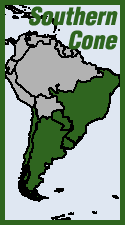 President José Mujica signed Uruguay's cannabis legalization bill into law on Christmas Eve, and the country's neighbors are preparing for the new policy to take effect—apparently with more trepidation than hope. Mujica is said to have discussed the question with Brazil's center-left President Dilma Rousseff on his visit last month to Brasília. Local media reported that she expressed fears about Uruguayan herb entering Brazil, and announced plans to beef up searches at the border—with plans to impose stiff sentences of 10 years and up for trafficking (including "transnational" personal possession).
President José Mujica signed Uruguay's cannabis legalization bill into law on Christmas Eve, and the country's neighbors are preparing for the new policy to take effect—apparently with more trepidation than hope. Mujica is said to have discussed the question with Brazil's center-left President Dilma Rousseff on his visit last month to Brasília. Local media reported that she expressed fears about Uruguayan herb entering Brazil, and announced plans to beef up searches at the border—with plans to impose stiff sentences of 10 years and up for trafficking (including "transnational" personal possession).
But while Brazilian leaders expressed respect for Uruguay's right to make its own policy, the reaction has been less tolerant in Paraguay. The landlocked country is South America's top cannabis producer by far, supplying most of the product consumed in both Brazil and Uruguay. A 2013 US State Department report (PDF) called it a "major drug transit country and money laundering center." It also underwent a right-wing coup d'etat last year, and the new administration is manifestly unhappy with the change in Uruguay. The head of Paraguay’s National Anti-Drug Secretariat, Luis Rojas, told Spanish news agency EFE that Uruguayan legalization would actually be a boon to Paraguay's producers—despite being designed to undercut them, with their links to violent Brazilian criminal networks. "The Uruguayan market is going to receive the marijuana that they produce and they’re not going to stop receiving the marijuana produced in Paraguay," Rojas said. "We are more than convinced it is going to stimulate internal consumption and thus the trafficking of marijuana towards there." (Quartz, Dec. 21; Worldcrunch, Dec. 19; Fusion, Dec. 13)
This assessment is based on two premises. The first is that even the reduced price for domestic legal cannabis in Uruguay—projected at a mere $1 per gram—will not sufficiently undercut the Paraguayan exporters. Rojas claims Paraguayan pot sells for $300 a kilo in Uruguay, which of course comes out to 30 cents per gram. But this conveniently fails to take into account the mark-up for sale of smaller quantities, which is how illegal networks always operate.
The second premise is even more faulty: that legalization will lead to increased demand in Uruguay. Evidence suggests it actually works the other way: a more tolerant climate drives down consumption. The Drug War Facts website provides statistics from the US government's own Substance Abuse and Mental Health Services Administration comparing consumption levels in the intolerant US and the liberal Netherlands. In 2009, the last year statistics were available for, lifetime prevalence of cannabis use for adults and adolescents was 41.5% in the US and 25.7% in the Netherlands. Prevalnce of use within the last year was 11.3% in the US and 7% in the Netherlands. The prison population rate per 100,000, by the way, was 716 in the US and 82 in the Netherlands. The homicide rate, for good measure, was 5 in the US and 1.1 in the Netherlands. And lifetime prevelance of heroin use was 1.5% in the US and 0.5% in the Netherlands.
With the Netherlands now tightening up on cannabis under international pressure, Uruguay will be the place to watch to see if this trend, so counter to the conventional "drug war" logic, will again play itself out.
Cross-post to High Times







Recent comments
4 weeks 1 day ago
4 weeks 2 days ago
7 weeks 2 days ago
8 weeks 2 days ago
12 weeks 2 days ago
16 weeks 19 hours ago
20 weeks 1 day ago
20 weeks 6 days ago
30 weeks 6 days ago
34 weeks 6 days ago